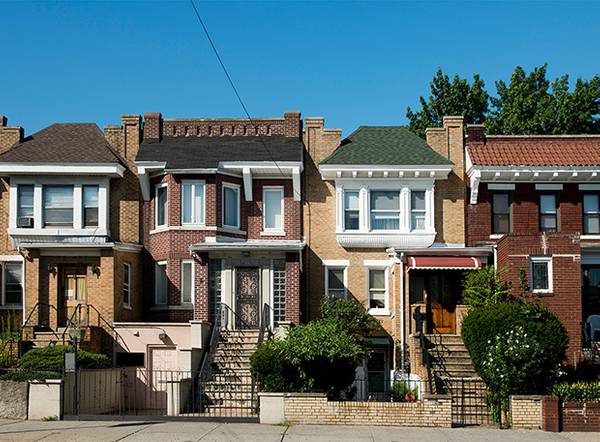
How Do FHA Loans Work?
FHA mortgage loans are home loans regulated and insured by the Federal Housing Administration (FHA). The FHA is the largest insurer of residential mortgages in the world. FHA loans were created in the 1930s to enable a broader spectrum of Americans to become homeowners and, to fulfill this goal, they have less restrictive qualifying guidelines than traditional mortgages. Their lower minimum credit scores and lower minimum down payments make them very attractive for first-time home buyers.
Benefits of FHA Loans for First-Time Home Buyers
With lower down payment requirements, FHA loans are beneficial for those who would like to buy a home but haven’t been able to put a lot of money away for the purchase, like newlyweds, recent college graduates, or even current students.
This loan often works well for first-time home buyers because it allows them to finance up to 96.5 percent of their home loan, helping to keep down payments and closing costs very low. The 203(b) home loan, the most popular type of FHA-backed loan, is also the only mortgage that allows 100 percent of closing costs to be a gift from a relative, non-profit, or government agency. In other words, buyers don’t have to have those funds saved up in advance; they can use family gifts or assistance grants to cover closing costs. Outside funds can also be used in the down payment.
Because FHA loans often require lower minimum credit scores, they allow individuals to qualify for a home loan whose credit has been dinged by financial problems. However, particularly relevant to first-time home buyers, they also enable individuals to borrow who haven’t yet been able to build a solid credit history.
Should I Choose an FHA Loan Over a Conventional Loan?
First-time home buyers who are wondering if an FHA loan is best for them have three basic factors to compare:
Credit score requirements. A common minimum credit score for a traditional mortgage is around 620, a score that is generally considered “fair.” Higher scores can earn borrowers lower interest rates. However, for first-time home buyers whose credit score is below 620, an FHA loan with a minimum required credit score of around 500 offers a better chance for approval.
Down payment requirements. For credit scores of 580+, FHA borrowers can have a down payment as low as only 3.5 percent. For credit scores of 500-579, the amount of down payment required can go up to as much as 20 percent. Traditional loans commonly require either a down payment of at least 20 percent or private mortgage insurance, which remains on the loan and raises the monthly payments until certain conditions are met.
Repayment terms flexibility. Traditional loans offer more flexibility than FHA loans in repayment terms. Traditional mortgages are available with either fixed or variable interest rates. FHA loans offer only fixed rates. Traditional loans are available with terms of 10, 15, 20, or 30 years, while borrowers must choose between 15 and 30 years for an FHA loan.
There are a number of calculations that can help potential home buyers understand if it makes sense financially to take on an FHA mortgage. Our monthly payments calculator can help prospective home buyers determine how much it will cost to buy a home and our home affordability calculator can indicate if renting might be a better option for a little while longer.
It’s important to realize that FHA loans do include mortgage insurance premiums of 0.45 to 1.05 percent annually. This should be included in your considerations. If you have any questions about whether an FHA mortgage is a good idea for you, our Bethpage mortgage experts are always available to help.
Do I Qualify for a FHA Loan?
To qualify for an FHA loan, a prospective borrower must have:
- FICO® score at least 580 and a 3.5% down payment.
- FICO® score between 500 and 579 and a 10% down payment.
- Required MIP (Mortgage Insurance Premium ) — 1.75% of the loan amount upfront.
- Debt-to-Income Ratio of less than 43%.
- Steady income and proof of employment.
- The home must be the borrower’s primary residence.
To receive approval for a mortgage, borrowers need to submit the following documentation:
- Most recent pay stubs for all jobs covering the most recent 30 days. Please be prepared to provide any future pay stubs until your loan process is complete.
- Past two (2) years w2’s.
- Past two (2) years 1040s with all schedules and pages as well as any business tax returns, if applicable.
- Last two (2) months bank statements, all pages, for all bank and retirement accounts listed on your application.
- Complete disclosure package signed by you.
- Divorce Decree or Child Support documentation, all pages, if applicable.
- Contract of sale for your new home, signed and dated by all parties.
- Your attorney’s contact information.
- Your real estate agents contact information.
- Method of payment for your appraisal fees.
The mortgage approval process can seem complex and confusing to first-time home buyers, but our mortgage experts will be there every step of the way to guide you through it and answer any questions.
FHA Loan Pre-Qualification and Home Shopping
Buying your first home is a huge step in life. That’s why we’ve prepared comprehensive resources to help you understand the process and make the right decisions along the way. We’re also here to help answer any additional questions you have.
Some suggestions to help you prepare include our First Time Home Buyer’s Guide and our guide to Preparing for Homeownership.
Once you’ve read up on what to expect, you can get your home shopping off on the right foot by applying for pre-qualification from Bethpage. A pre-qualification is a firm offer to lend based upon information you provide to us in your loan application. You’re likely to find, especially in a competitive market (or a “seller’s” market) that a realtor will not even take you to look at a home without pre-qualification paperwork.
Ready to get started? Contact us and start applying for your FHA loan today!
- Categories:



